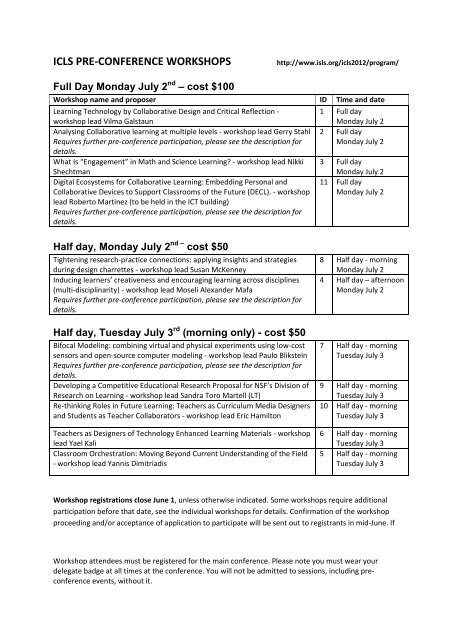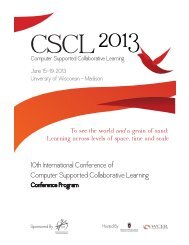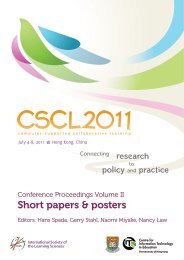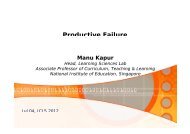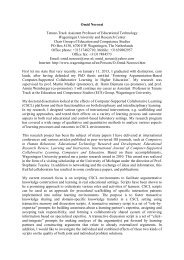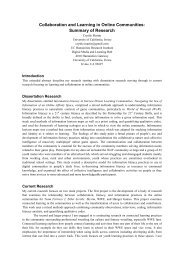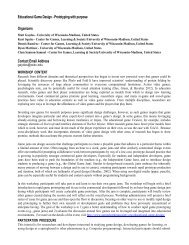icls pre-conference workshops - ISLS International Society of the ...
icls pre-conference workshops - ISLS International Society of the ...
icls pre-conference workshops - ISLS International Society of the ...
You also want an ePaper? Increase the reach of your titles
YUMPU automatically turns print PDFs into web optimized ePapers that Google loves.
ICLS PRE‐CONFERENCE WORKSHOPS<br />
http://www.isls.org/<strong>icls</strong>2012/program/<br />
Full Day Monday July 2 nd – cost $100<br />
Workshop name and proposer ID Time and date<br />
Learning Technology by Collaborative Design and Critical Reflection ‐<br />
workshop lead Vilma Galstaun<br />
Analysing Collaborative learning at multiple levels ‐ workshop lead Gerry Stahl<br />
Requires fur<strong>the</strong>r <strong>pre</strong>‐<strong>conference</strong> participation, please see <strong>the</strong> description for<br />
details.<br />
What Is “Engagement” in Math and Science Learning? ‐ workshop lead Nikki<br />
Shechtman<br />
Digital Ecosystems for Collaborative Learning: Embedding Personal and<br />
Collaborative Devices to Support Classrooms <strong>of</strong> <strong>the</strong> Future (DECL). ‐ workshop<br />
lead Roberto Martinez (to be held in <strong>the</strong> ICT building)<br />
Requires fur<strong>the</strong>r <strong>pre</strong>‐<strong>conference</strong> participation, please see <strong>the</strong> description for<br />
details.<br />
1 Full day<br />
Monday July 2<br />
2 Full day<br />
Monday July 2<br />
3 Full day<br />
Monday July 2<br />
11 Full day<br />
Monday July 2<br />
Half day, Monday July 2 nd – cost $50<br />
Tightening research‐practice connections: applying insights and strategies<br />
during design charrettes ‐ workshop lead Susan McKenney<br />
Inducing learners’ creativeness and encouraging learning across disciplines<br />
(multi‐disciplinarity) ‐ workshop lead Moseli Alexander Mafa<br />
Requires fur<strong>the</strong>r <strong>pre</strong>‐<strong>conference</strong> participation, please see <strong>the</strong> description for<br />
details.<br />
Half day, Tuesday July 3 rd (morning only) - cost $50<br />
Bifocal Modeling: combining virtual and physical experiments using low‐cost<br />
sensors and open‐source computer modeling ‐ workshop lead Paulo Blikstein<br />
Requires fur<strong>the</strong>r <strong>pre</strong>‐<strong>conference</strong> participation, please see <strong>the</strong> description for<br />
details.<br />
Developing a Competitive Educational Research Proposal for NSF’s Division <strong>of</strong><br />
Research on Learning ‐ workshop lead Sandra Toro Martell (LT)<br />
Re‐thinking Roles in Future Learning: Teachers as Curriculum Media Designers<br />
and Students as Teacher Collaborators ‐ workshop lead Eric Hamilton<br />
Teachers as Designers <strong>of</strong> Technology Enhanced Learning Materials ‐ workshop<br />
lead Yael Kali<br />
Classroom Orchestration: Moving Beyond Current Understanding <strong>of</strong> <strong>the</strong> Field<br />
‐ workshop lead Yannis Dimitriadis<br />
8 Half day ‐ morning<br />
Monday July 2<br />
4 Half day – afternoon<br />
Monday July 2<br />
7 Half day ‐ morning<br />
Tuesday July 3<br />
9 Half day ‐ morning<br />
Tuesday July 3<br />
10 Half day ‐ morning<br />
Tuesday July 3<br />
6 Half day ‐ morning<br />
Tuesday July 3<br />
5 Half day ‐ morning<br />
Tuesday July 3<br />
Workshop registrations close June 1, unless o<strong>the</strong>rwise indicated. Some <strong>workshops</strong> require additional<br />
participation before that date, see <strong>the</strong> individual <strong>workshops</strong> for details. Confirmation <strong>of</strong> <strong>the</strong> workshop<br />
proceeding and/or acceptance <strong>of</strong> application to participate will be sent out to registrants in mid‐June. If<br />
Workshop attendees must be registered for <strong>the</strong> main <strong>conference</strong>. Please note you must wear your<br />
delegate badge at all times at <strong>the</strong> <strong>conference</strong>. You will not be admitted to sessions, including <strong>pre</strong><strong>conference</strong><br />
events, without it.
ICLS PRE‐CONFERENCE WORKSHOPS<br />
http://www.isls.org/<strong>icls</strong>2012/program/<br />
participants are not accepted, or a workshop will not run, <strong>the</strong> workshop fee will be refunded to <strong>the</strong><br />
same card used for payment.<br />
To attend a workshop, you must also register to attend <strong>the</strong> main <strong>conference</strong>. Workshop registration and<br />
payment takes place through <strong>the</strong> <strong>conference</strong> system at http://www.isls.org/<strong>icls</strong>2012/submit/ at <strong>the</strong><br />
time <strong>of</strong> registration. Please ensure you do not register for clashing <strong>workshops</strong>.<br />
Table <strong>of</strong> Contents<br />
1. Learning Technology by Collaborative Design and Critical Reflection .............................................. 3<br />
2. Analyzing collaborative learning at multiple levels .......................................................................... 4<br />
3. What Is “Engagement” in Math and Science Learning? ................................................................... 5<br />
4. Inducing Learners’ Creativeness and Encouraging Learning Across Disciplines ............................... 7<br />
5. Classroom Orchestration: Moving Beyond Current Understanding <strong>of</strong> <strong>the</strong> Field .............................. 8<br />
6. Teachers as Designers <strong>of</strong> Technology‐Enhanced Learning Materials ............................................. 10<br />
7. Bifocal Modeling: ........................................................................................................................... 11<br />
8. Tightening research‐practice connections ...................................................................................... 13<br />
9 Developing a Competitive Educational Research Proposal for NSF’s Division <strong>of</strong> Research on<br />
Learning................................................................................................................................................... 14<br />
10. Re‐thinking Roles in Future Learning: ......................................................................................... 15<br />
11. Digital Ecosystems for Collaborative Learning (DECL 2012) ....................................................... 16<br />
Workshop attendees must be registered for <strong>the</strong> main <strong>conference</strong>. Please note you must wear your<br />
delegate badge at all times at <strong>the</strong> <strong>conference</strong>. You will not be admitted to sessions, including <strong>pre</strong><strong>conference</strong><br />
events, without it.
ICLS PRE‐CONFERENCE WORKSHOPS<br />
http://www.isls.org/<strong>icls</strong>2012/program/<br />
1. Learning Technology by Collaborative Design and Critical Reflection<br />
<br />
<br />
<br />
<br />
<br />
Vilma Galstaun, Faculty <strong>of</strong> Education and Social Work, University <strong>of</strong> Sydney, Sydney, Australia,<br />
vilma.galstaun@sydney.edu.au<br />
Shannon Kennedy‐Clark, Department <strong>of</strong> Teaching and Learning, Australian Catholic University,<br />
Sydney, Australia, shannon.kennedy‐clark@acu.edu.au<br />
Kate Anderson, Faculty <strong>of</strong> Education and Social Work, University <strong>of</strong> Sydney, Sydney, Australia,<br />
k.anderson@sydney.edu.au<br />
Martin Parisio, Centre for Research on Computer‐Supported Learning and Cognition, Faculty <strong>of</strong><br />
Education and Social Work, University <strong>of</strong> Sydney, Sydney, Australia, martin.parisio@sydney.edu.au<br />
<br />
Wai Yat Wong, Faculty <strong>of</strong> Education and Social Work, University <strong>of</strong> Sydney, Sydney, Australia,<br />
wai.yat.wong@sydney.edu.au<br />
Heman Chan, Faculty <strong>of</strong> Education and Social Work, University <strong>of</strong> Sydney, Sydney, Australia,<br />
heman.chan@sydney.edu.au<br />
This is a practical workshop where attendees will participate in a learn‐by‐collaborative‐design task.<br />
Participants will work in small groups to design and develop a digital story learning/teaching resource.<br />
A collaborative approach in both <strong>the</strong> design <strong>of</strong> <strong>the</strong> tasks using information and communication<br />
technologies (ICT) and providing critical feedback through a peer‐review process is used. In practice,<br />
design‐based learning activities are usually collaborative. Participants will develop a deeper<br />
understanding <strong>of</strong> how to design collaborative technology enhanced learning activities for students<br />
through <strong>the</strong> experiences <strong>of</strong> both dialogue and reflection.<br />
Two technologies will be used in this workshop. Firstly, iMovie will be used to develop a digital story.<br />
Participants will <strong>the</strong>n evaluate <strong>the</strong>ir peers’ digital stories using <strong>the</strong> collaborative annotation tool, EVA<br />
(Educational Video with collaborative Annotation). As part <strong>of</strong> <strong>the</strong> design and development <strong>of</strong> <strong>the</strong> digital<br />
story, EVA will be used for collaborative peer reviewing in <strong>the</strong> evaluation phase <strong>of</strong> <strong>the</strong> workshop.<br />
The focus <strong>of</strong> <strong>the</strong> workshop is not <strong>the</strong> development <strong>of</strong> technical skills; ra<strong>the</strong>r it is <strong>the</strong> process <strong>of</strong> using<br />
video annotation s<strong>of</strong>tware to provide critical and collaborative peer feedback and for participants to<br />
critically reflect on <strong>the</strong> feedback given so as to make improvements to <strong>the</strong>ir digital story. This workshop<br />
is designed to adapt to <strong>the</strong> needs <strong>of</strong> <strong>the</strong> participants in developing technical and <strong>the</strong>oretical<br />
experiences <strong>of</strong> <strong>the</strong> learn‐technology‐by‐design approach.<br />
The target audience is <strong>conference</strong> participants who have an interest in learning how to use design tasks<br />
using ICT and collaborative tools such as EVA (or similar annotation and analysis technologies) for peer<br />
collaboration, critical peer feedback and self‐reflection. The target audience are both practitioners and<br />
educational researchers. Participants working in teacher education will find particular value in attending<br />
this workshop as it will also draw on <strong>the</strong> experiences in teacher education over <strong>the</strong> past several years.<br />
Workshop attendees must be registered for <strong>the</strong> main <strong>conference</strong>. Please note you must wear your<br />
delegate badge at all times at <strong>the</strong> <strong>conference</strong>. You will not be admitted to sessions, including <strong>pre</strong><strong>conference</strong><br />
events, without it.
ICLS PRE‐CONFERENCE WORKSHOPS<br />
http://www.isls.org/<strong>icls</strong>2012/program/<br />
2. Analyzing collaborative learning at multiple levels<br />
<br />
<br />
<br />
<br />
Gerry Stahl, Drexel University, USA<br />
Keith Sawyer, Washington University in St. Louis, USA<br />
Heisawn Jeong, Hallym University, South Korea<br />
Dan Su<strong>the</strong>rs, University <strong>of</strong> Hawaii, USA<br />
How might learning that takes place at individual, small group and collective (community or networked)<br />
levels connect to each o<strong>the</strong>r? This workshop will consist <strong>of</strong> two data sessions exploring connections<br />
across levels. Data <strong>pre</strong>senters will describe <strong>the</strong> background <strong>of</strong> <strong>the</strong> data and data analysts will <strong>pre</strong>sent<br />
results <strong>of</strong> <strong>pre</strong>liminary analyses. Workshop participants will <strong>the</strong>n collaboratively explore data excerpts<br />
and discuss how different levels <strong>of</strong> analyses and associated <strong>the</strong>ories might connect to each o<strong>the</strong>r.<br />
Prior to <strong>the</strong> workshop, <strong>the</strong> workshop organizers will select two appropriate datasets, and will <strong>pre</strong>pare<br />
excerpts from <strong>the</strong> datasets for distribution to workshop participants. The organizers will also select a<br />
number <strong>of</strong> participants to <strong>pre</strong>pare data analyses in advance, in order to seed <strong>the</strong> workshop discussion<br />
and orient it toward multiple levels <strong>of</strong> analysis.<br />
The workshop will consist primarily <strong>of</strong> two data session, during which participants will break into small<br />
groups and discuss how <strong>the</strong> dataset and accompanying analyses address <strong>the</strong> <strong>the</strong>oretical and<br />
methodological issues <strong>of</strong> <strong>the</strong> workshop. The groups will report back with <strong>the</strong>ir conclusions.<br />
In addition to registration, fur<strong>the</strong>r application/information is necessary from participants wishing to<br />
attend <strong>the</strong> workshop.<br />
Researchers interested in participating in <strong>the</strong> workshop should submit a brief application (one or two<br />
pages) that summarizes <strong>the</strong>ir relevant prior experience, objectives in participating in this workshop, and<br />
a short bibliography <strong>of</strong> relevant publications or a URL providing fur<strong>the</strong>r information on <strong>the</strong> researcher's<br />
work. (Researchers wishing to <strong>pre</strong>sent data illustrating connecting levels at <strong>the</strong> workshop are<br />
encouraged to contact <strong>the</strong> organizers.)<br />
Participants should send <strong>the</strong>ir applications to Gerry Stahl at Gerry.Stahl@drexel.edu and Heisawn Jeong<br />
at heisawnj@gmail.com for consideration. Acceptance decisions will be sent out before well in advance<br />
<strong>of</strong> <strong>conference</strong> registration closing on June 1. (Data <strong>pre</strong>senters will be expected to provide data to<br />
analysts by April 15, 2012.)<br />
Workshop attendees must be registered for <strong>the</strong> main <strong>conference</strong>. Please note you must wear your<br />
delegate badge at all times at <strong>the</strong> <strong>conference</strong>. You will not be admitted to sessions, including <strong>pre</strong><strong>conference</strong><br />
events, without it.
ICLS PRE‐CONFERENCE WORKSHOPS<br />
http://www.isls.org/<strong>icls</strong>2012/program/<br />
3. What Is “Engagement” in Math and Science Learning?<br />
An Evidence‐Centered Design Workshop to Develop Working Definitions and Measurement Approaches<br />
Workshop Organisers<br />
Nicole Shechtman, SRI <strong>International</strong> : nicole.shechtman@sri.com (lead)<br />
K. Ann Renninger, Swarthmore College<br />
Judith Harackiewicz, University <strong>of</strong> Wisconsin, Madison<br />
Britte Cheng, SRI <strong>International</strong><br />
Geneva Haertel, SRI <strong>International</strong><br />
Rationale<br />
While it is clear that “engagement” is critical to learning math and science, <strong>the</strong>re is a pervasive need in<br />
<strong>the</strong> field to operationalize <strong>the</strong> core constructs <strong>of</strong> engagement and develop useful measurement<br />
approaches. For example, engagement has behavioural, affective, and cognitive components that<br />
interact in <strong>the</strong> process <strong>of</strong> learning. Our multidisciplinary approach brings toge<strong>the</strong>r learning scientists<br />
with deep expertise in engagement and assessment specialists from <strong>the</strong> tradition <strong>of</strong> Evidence‐Centered<br />
Design (ECD)—a research‐based methodology for designing rigorous measurement instruments.<br />
Content<br />
Participants will engage in a series <strong>of</strong> collaborative group activities designed to explore <strong>the</strong> multiple<br />
facets <strong>of</strong> engagement, existing measures, potential working definitions, and <strong>the</strong> design space for<br />
instrumentation. Exercises will be based on ECD methods that result in shared understandings <strong>of</strong> <strong>the</strong><br />
important underlying dimensions and “design patterns” that provide structured narratives specifying<br />
measurement design requirements.<br />
Outcomes<br />
1. To provide an opportunity to think critically as a community about <strong>the</strong> current<br />
operationalizations and measurement approaches for engagement, and examine<br />
implications for participants’ own research.<br />
2. To ga<strong>the</strong>r and share a set <strong>of</strong> instruments and approaches to measuring engagement.<br />
3. To develop design documents that can be used for fur<strong>the</strong>r instrument development.<br />
4. To build a network <strong>of</strong> learning scientists and assessment specialists interested in studying<br />
engagement.<br />
Targeted Audience<br />
We invite participants <strong>of</strong> any level <strong>of</strong> expertise in research on engagement, participants from <strong>the</strong> full<br />
spectrum <strong>of</strong> <strong>the</strong>oretical and methodological orientations, and those who focus on math and/or science<br />
content targeting students at any age level.<br />
Workshop attendees must be registered for <strong>the</strong> main <strong>conference</strong>. Please note you must wear your<br />
delegate badge at all times at <strong>the</strong> <strong>conference</strong>. You will not be admitted to sessions, including <strong>pre</strong><strong>conference</strong><br />
events, without it.
ICLS PRE‐CONFERENCE WORKSHOPS<br />
http://www.isls.org/<strong>icls</strong>2012/program/<br />
O<strong>the</strong>r Important Information<br />
We will shape <strong>the</strong> activities based on <strong>the</strong> expertise and interests <strong>of</strong> <strong>the</strong> attendees. As <strong>pre</strong>paration,<br />
participants will be asked to provide a short bio, respond to a <strong>pre</strong>‐workshop survey about <strong>the</strong>ir<br />
background, and identify instruments and methodological approaches.<br />
Workshop attendees must be registered for <strong>the</strong> main <strong>conference</strong>. Please note you must wear your<br />
delegate badge at all times at <strong>the</strong> <strong>conference</strong>. You will not be admitted to sessions, including <strong>pre</strong><strong>conference</strong><br />
events, without it.
ICLS PRE‐CONFERENCE WORKSHOPS<br />
http://www.isls.org/<strong>icls</strong>2012/program/<br />
4. Inducing Learners’ Creativeness and Encouraging Learning Across<br />
Disciplines<br />
Moseli Mafa, Lesotho College <strong>of</strong> Education, moseli3712@gmail.com<br />
Mamotena Jankie, Lesotho College <strong>of</strong> Education, mamjankie@yahoo.co.uk<br />
Palesa Khotso, Lesotho college <strong>of</strong> Education, palesakhotso@yahoo.com<br />
Makomosela Qhobela, National University <strong>of</strong> Lesotho, m.qhobela@nul.ls<br />
Workshop Description<br />
This workshop seeks to expose some innovative teaching/learning practices and methods that enhance<br />
learners’ creativity and/or learning across disciplines. It is meant for <strong>pre</strong>sentation, discussion and<br />
reconstruction <strong>of</strong> <strong>the</strong>se research findings, hence inform educators in teaching/learning for creativity and<br />
trans‐disciplinarity. It is also aimed at informing researchers’ inquiry strategies on creativity and transdisciplinary<br />
ways <strong>of</strong> knowing.<br />
Background<br />
The world is <strong>pre</strong>sently confronted with such challenges as rapid climatic whe<strong>the</strong>r changes, disease<br />
pandemics, and o<strong>the</strong>r socio‐economic problems. In response, versatile, creative and adaptive citizens<br />
are needed. Consequently, this workshop argues for educators and researchers to seek and develop<br />
learning modalities for boosting learners’ creativity and knowing across disciplines. Thus, <strong>the</strong> central<br />
<strong>the</strong>mes for constructing and developing <strong>the</strong>se modes <strong>of</strong> learning are: Creativity, Trans‐disciplinarity and<br />
Transformative Learning. These are based on <strong>the</strong> notion <strong>of</strong> transforming <strong>pre</strong>sent ways <strong>of</strong> knowing into<br />
unrestricted acquisition <strong>of</strong> skills for creativeness.<br />
Format and Schedule <strong>of</strong> Activities<br />
The workshop shall run over three sessions, in <strong>the</strong> afternoon <strong>of</strong> Monday, 2 nd July 2012.<br />
Session one ‐ Organizer and/or instructors shall provide <strong>the</strong> purpose and <strong>the</strong>oretical framework.<br />
Session two‐ Participants form break‐up groups; to <strong>pre</strong>sent , analyse, discuss and reconstruct<br />
learning model(s).<br />
<br />
Session three‐ All group discussion for fur<strong>the</strong>r inputs and improvements on <strong>the</strong> Model(s) and<br />
<strong>the</strong>ir research implications.<br />
Audience and Participation Requirements ‐ In addition to registration, fur<strong>the</strong>r application/information<br />
is necessary from participants wishing to attend <strong>the</strong> workshop.<br />
Interested researchers and educators should submit statement(s) (500‐600 words) <strong>of</strong> intent to ei<strong>the</strong>r<br />
<strong>pre</strong>sent <strong>the</strong>ir work, discuss or make any inputs regarding <strong>the</strong> workshop objectives. These will be checked<br />
by three workshop organisers. Submissions should reach organizers at <strong>the</strong> emails above, through e‐mail<br />
attachments, by May 21st 2012; and notification for acceptance shall be made by May 28 th . Conference<br />
registration closes on June 1 st .<br />
Workshop attendees must be registered for <strong>the</strong> main <strong>conference</strong>. Please note you must wear your<br />
delegate badge at all times at <strong>the</strong> <strong>conference</strong>. You will not be admitted to sessions, including <strong>pre</strong><strong>conference</strong><br />
events, without it.
ICLS PRE‐CONFERENCE WORKSHOPS<br />
http://www.isls.org/<strong>icls</strong>2012/program/<br />
5. Classroom Orchestration: Moving Beyond Current Understanding <strong>of</strong> <strong>the</strong><br />
Field<br />
Workshop organizers<br />
a. Yannis Dimitriadis, University <strong>of</strong> Valladolid, Spain (contact person)<br />
b. Pierre Dillenbourg, EPFL, Lausanne, Switzerland<br />
c. Miguel Nussbaum, Pontificia Universidad Católica de Chile, Chile<br />
d. Chee‐Kit Looi, Nanyang Technological University, Singapore<br />
e. Jeremy Roschelle, Stanford Research Institute <strong>International</strong>, USA<br />
1. Rationale:<br />
Sustainability <strong>of</strong> innovative teaching and learning practices highly depends on effective scenarios in <strong>the</strong> complex<br />
classroom ecosystem, integrating multiple activities and tools at multiple social planes and contexts. Such<br />
multiplicity demands a holistic perspective implementing a flexible “orchestration layer” through ei<strong>the</strong>r<br />
technological or conceptual tools. One main question that arises is not only how do we change <strong>the</strong> curriculum and<br />
classical assessments to reach <strong>the</strong>se goals but also how do we organize <strong>the</strong> classroom, <strong>the</strong> available resources and<br />
<strong>the</strong> teachers role to achieve this transformation.<br />
Orchestration has emerged recently as a driving concept and metaphor. The complexity <strong>of</strong> <strong>the</strong> related issues has<br />
motivated a vivid debate in <strong>the</strong> community, which took <strong>the</strong> shape <strong>of</strong> multiple papers and reports that employ and<br />
explore <strong>the</strong> concept <strong>of</strong> orchestration, as well as a highly successful workshop at CSCL 2011.<br />
Some converging issues that emerged in this debate deal with <strong>the</strong> characteristics and graphical re<strong>pre</strong>sentations <strong>of</strong><br />
integrated pedagogical scenarios, as well as <strong>the</strong> need to empower teachers in <strong>the</strong> real‐time management <strong>of</strong> such<br />
scenarios, so that <strong>the</strong>y can flexibly enact designs and technologies (ei<strong>the</strong>r ICT‐based or not) in a minimalist way,<br />
taking into account <strong>the</strong> practicalities and time‐space constraints <strong>of</strong> classrooms. On <strong>the</strong> o<strong>the</strong>r hand, several issues<br />
are still subject <strong>of</strong> discussion, as e.g. <strong>the</strong> power and limitations <strong>of</strong> <strong>the</strong> underlying metaphor, <strong>the</strong> design <strong>of</strong><br />
adequate orchestration and orchestrable technologies, <strong>the</strong> right balance between planning and enactment,<br />
external and internal scripts, or <strong>the</strong> ways to advance towards a better usability at <strong>the</strong> classroom level.<br />
2. Content:<br />
The workshop builds on <strong>the</strong> considerable recent advances on classroom orchestration in <strong>the</strong> community and aims<br />
to deepen <strong>the</strong> discussion and analysis <strong>of</strong> <strong>the</strong> divergent and convergent aspects, expecting to shed light on <strong>the</strong><br />
concept, issues and eventual approaches towards effective integration <strong>of</strong> pedagogical scenarios in current and<br />
future classroom ecosystems. On <strong>the</strong> o<strong>the</strong>r hand, it aims to provide a common ground with o<strong>the</strong>r related fields,<br />
such as Learning Design, Pedagogical Patterns or Human Computer Interaction.<br />
The half‐day workshop, besides a short overview <strong>of</strong> <strong>the</strong> field, will be based on case studies submitted by <strong>the</strong><br />
participants. Senior researchers, including those from <strong>the</strong> organizing committee, will analyze <strong>the</strong> case studies from<br />
<strong>the</strong> point <strong>of</strong> view <strong>of</strong> <strong>the</strong> <strong>pre</strong>vailing issues in orchestration. Finally, all workshop participants will reshape and<br />
reformulate <strong>the</strong> landscape <strong>of</strong> classroom orchestration, and eventually lead to a new collective publication on <strong>the</strong><br />
challenges <strong>of</strong> <strong>the</strong> field.<br />
Workshop attendees must be registered for <strong>the</strong> main <strong>conference</strong>. Please note you must wear your<br />
delegate badge at all times at <strong>the</strong> <strong>conference</strong>. You will not be admitted to sessions, including <strong>pre</strong><strong>conference</strong><br />
events, without it.
ICLS PRE‐CONFERENCE WORKSHOPS<br />
http://www.isls.org/<strong>icls</strong>2012/program/<br />
3. Outcomes<br />
a. Critical analysis and collective syn<strong>the</strong>sis regarding case studies described in <strong>the</strong> accepted papers from <strong>the</strong><br />
orchestration point <strong>of</strong> view<br />
b. Production <strong>of</strong> a new concept map related to <strong>the</strong> main issues on orchestration<br />
c. Generation <strong>of</strong> a syn<strong>the</strong>sis paper based on <strong>the</strong> workshop proceedings after <strong>the</strong> workshop<br />
d. Eventual joint publication <strong>of</strong> <strong>the</strong> papers <strong>pre</strong>sented in <strong>the</strong> workshop and an overview <strong>of</strong> <strong>the</strong> current trends<br />
on orchestration in an international journal or book, to be defined<br />
4. Targeted audience:<br />
a. Senior researchers who have been involved in <strong>the</strong> recent debate on <strong>the</strong> role and scope <strong>of</strong> classroom<br />
orchestration<br />
b. Young researchers or practitioners who can provide challenging case studies that may illustrate integrated<br />
learning scenarios and <strong>the</strong> associated orchestration issues<br />
c. Researchers from <strong>the</strong> related fields <strong>of</strong> Learning Design and Pedagogical Patterns, as well as Human<br />
Computer Interaction<br />
5. O<strong>the</strong>r important information for potential attendees<br />
Paper submission process:<br />
All accepted papers will be published at <strong>the</strong> on‐line (and eventually) paper‐based workshop proceedings and<br />
provided as a material to participants. However, only up to five (5) papers will be accepted for oral <strong>pre</strong>sentation at<br />
<strong>the</strong> workshop.<br />
Accepted papers will be considered for publication at a journal special issue and/or an edited book on Classroom<br />
Orchestration. Specific instructions will be provided at and after <strong>the</strong> workshop.<br />
The schedule for paper submission and acceptance is <strong>the</strong> following:<br />
Publication <strong>of</strong> <strong>the</strong> <strong>of</strong>ficial call for papers: March 1<br />
Paper submission: April 30<br />
Acceptance notification: May 14<br />
Registration at <strong>the</strong> workshop closes: June 1<br />
Workshop: July 3 (09:00-12:30)<br />
For more updated information visit: Workshop website<br />
https://sites.google.com/site/<strong>icls</strong>orchestration2012/<br />
6. Workshop organisers’ contact details:<br />
Any interested persons may contact <strong>the</strong> Workshops organizers by e‐mail at:<br />
orchestration2012@gmail.com<br />
Workshop attendees must be registered for <strong>the</strong> main <strong>conference</strong>. Please note you must wear your<br />
delegate badge at all times at <strong>the</strong> <strong>conference</strong>. You will not be admitted to sessions, including <strong>pre</strong><strong>conference</strong><br />
events, without it.
ICLS PRE‐CONFERENCE WORKSHOPS<br />
http://www.isls.org/<strong>icls</strong>2012/program/<br />
6. Teachers as Designers <strong>of</strong> Technology‐Enhanced Learning Materials<br />
Research on factors affecting curriculum implementation has pointed to <strong>the</strong> importance <strong>of</strong> involving<br />
teachers, to varying degrees, in shaping <strong>the</strong> learning scenarios in <strong>the</strong>ir own classrooms. While <strong>the</strong><br />
benefits <strong>of</strong> Teachers as Designers (TaD) are acknowledged in literature, far less is known about ways <strong>of</strong><br />
shaping that involvement to yield those benefits. Research is needed to understand how teachers learn<br />
through design, how such activities may be supported, and how teacher involvement in design<br />
partnerships with researchers impacts <strong>the</strong> quality <strong>of</strong> <strong>the</strong> artefacts created, <strong>the</strong>ir implementation, and<br />
ultimately, student learning.<br />
This workshop speaks to that need by bringing toge<strong>the</strong>r researchers and practitioners interested in<br />
fur<strong>the</strong>r exploring various TaD aspects. Participants will share existing TaD research and practice, discuss<br />
areas needing additional research, and actively engage in syn<strong>the</strong>sis activities. With <strong>the</strong> ultimate aim <strong>of</strong><br />
improving <strong>the</strong> quality and relevance <strong>of</strong> research related to this <strong>the</strong>me, this workshop will help generate<br />
a conceptual foundation for understanding <strong>the</strong> notion <strong>of</strong> TaD, to be shared among a broader<br />
community, possibly via a special issue <strong>of</strong> a scientific journal.<br />
In addition to registration, fur<strong>the</strong>r participation is necessary from participants wishing to attend <strong>the</strong><br />
workshop.<br />
Participation is open to: (a) contributors who will respond to a call for proposals and participate in <strong>pre</strong>,<br />
and post workshop activities aimed at publication in a special issue, and (b) commentators who will<br />
provide critique, infuse <strong>the</strong> discussion with <strong>the</strong>ir knowledge and experience, and assist in creating a<br />
lively and fruitful conversation, without fur<strong>the</strong>r commitment.<br />
Pre‐workshop activities (for contributors)<br />
February 15: Call for short paper proposals (2000‐3000 word) will be published<br />
April 1: Submission deadline<br />
April 22: Notifications (12 papers to be selected and invited for inclusion)<br />
June 26: 3 slides to be sent to organizers<br />
Post‐workshop activities<br />
Plans will be made during workshop to decide on next steps towards publication in special issue.<br />
Website<br />
https://sites.google.com/site/teachersasteldesigners<br />
Organisers’ contact information<br />
Yael Kali, yael.kali@gmail.com<br />
Susan McKenney, susan.mckenney@utwente.nl<br />
Workshop attendees must be registered for <strong>the</strong> main <strong>conference</strong>. Please note you must wear your<br />
delegate badge at all times at <strong>the</strong> <strong>conference</strong>. You will not be admitted to sessions, including <strong>pre</strong><strong>conference</strong><br />
events, without it.
ICLS PRE‐CONFERENCE WORKSHOPS<br />
http://www.isls.org/<strong>icls</strong>2012/program/<br />
7. Bifocal Modeling<br />
Combining virtual and physical experiments using low‐cost sensors and open‐source computer<br />
modeling<br />
<br />
<br />
<br />
<br />
<br />
<br />
Paulo Blikstein ‐ Stanford University, School <strong>of</strong> Education<br />
Tamar Fuhrmann ‐ Stanford University, School <strong>of</strong> Education<br />
Daniel Greene ‐ Stanford University, School <strong>of</strong> Education<br />
Shima Salehi ‐ Stanford University, School <strong>of</strong> Education<br />
Claire Rosenbaum ‐ Stanford University, School <strong>of</strong> Education<br />
Marcelo Worsley ‐ Stanford University, School <strong>of</strong> Education<br />
Bifocal Modeling (BM) is a framework for STEM learning that enables <strong>the</strong> exploration <strong>of</strong> <strong>the</strong> connection<br />
between computational models and <strong>the</strong> physical world, in real time ‐<br />
http://tltl.stanford.edu/projects/bifocal‐modeling<br />
BM provides opportunities for students to design a virtual model and physical experiment about a<br />
scientific phenomenon and connect <strong>the</strong>m in a real time to validate or control <strong>the</strong> model, refining <strong>the</strong>ir<br />
<strong>the</strong>ories about <strong>the</strong> underlying phenomena. The real‐time connection between real and physical models<br />
is beneficial in various ways such as allowing students to develop crucial STEM skills such as metamodeling,<br />
identifying and quantifying relevant parameters and variables, understanding error, <strong>pre</strong>cision,<br />
and time/scale discrepancies between real and ideal systems. In addition, one important aspect <strong>of</strong> thsi<br />
work is <strong>the</strong> development <strong>of</strong> low‐cost, easily deployable sensor‐based platforms.<br />
In this workshop, we will introduce <strong>the</strong> Bifocal Modeling approach to participants, examine its benefits<br />
and challenges, and identify key <strong>the</strong>mes for participants to develop <strong>the</strong>ir own BM activities. However,<br />
since <strong>the</strong>re is a lot <strong>of</strong> interest in real‐world sensing and modeling in <strong>the</strong> STEM community, we will also<br />
demonstrate and promote hands‐on exploration <strong>of</strong> many <strong>of</strong> <strong>the</strong> low‐cost sensing and modeling<br />
technologies that we have been developing at <strong>the</strong> TLT Lab at Stanford, which would be useful both for<br />
Bifocal Modeling but also for more general sensing and probeware activities. Therefore, participants will<br />
be exposed to <strong>the</strong> cutting‐edge <strong>of</strong> low‐cost sensing with wide applicability not only got BM but in many<br />
fields <strong>of</strong> hands‐on science learning, environmental sensing, and project‐based STEM learning in general.<br />
We invite anyone interested in using sensors and computer modeling activities for STEM learning,<br />
including educators and researchers working in STEM education, educational technologists, and projectbased<br />
learning experts. Prior experience with probeware or programming is helpful but *not* necessary.<br />
In addition to registration, fur<strong>the</strong>r participation is necessary from participants wishing to attend <strong>the</strong><br />
workshop.<br />
If you would like to participate in this workshop, please fill <strong>the</strong> form using <strong>the</strong> link below. If you want<br />
more information, please visit our website (http://tltl.stanford.edu ) or email us at<br />
Workshop attendees must be registered for <strong>the</strong> main <strong>conference</strong>. Please note you must wear your<br />
delegate badge at all times at <strong>the</strong> <strong>conference</strong>. You will not be admitted to sessions, including <strong>pre</strong><strong>conference</strong><br />
events, without it.
ICLS PRE‐CONFERENCE WORKSHOPS<br />
http://www.isls.org/<strong>icls</strong>2012/program/<br />
tltlaboratory@gmail.com. Applications will be reviewed by <strong>the</strong> workshop organizers, and <strong>the</strong> maximum<br />
number <strong>of</strong> participants is 20.<br />
All accepted attendees will receive one sensing and robotics kit for <strong>the</strong>m to keep and use in <strong>the</strong>ir<br />
projects, included in <strong>the</strong> registration fee.<br />
Deadline for submission: April 1st 2012.<br />
Application form: http://bit.ly/xlEWN1<br />
Workshop attendees must be registered for <strong>the</strong> main <strong>conference</strong>. Please note you must wear your<br />
delegate badge at all times at <strong>the</strong> <strong>conference</strong>. You will not be admitted to sessions, including <strong>pre</strong><strong>conference</strong><br />
events, without it.
ICLS PRE‐CONFERENCE WORKSHOPS<br />
http://www.isls.org/<strong>icls</strong>2012/program/<br />
8. Tightening research‐practice connections<br />
Applying insights and strategies during design charettes<br />
Educational research has long been criticized for its weak link with practice. Explicit attempts to close<br />
<strong>the</strong> research‐practice gap have been underway for over four decades. A robust, growing body <strong>of</strong><br />
knowledge now exists to describe: how policymakers and educators access, value and use research;<br />
various modes through which knowledge is generated and shared; and what aspects <strong>of</strong> evidence‐based<br />
practice and research utilization in o<strong>the</strong>r fields can be applied to education. However, both scholarly<br />
insights and effective practices have yet to become widely s<strong>pre</strong>ad.<br />
The proposed workshop addresses this problem, and aims to:<br />
(a) sensitize participants to different modes <strong>of</strong> research‐practice interaction, and <strong>the</strong>ir<br />
implications for <strong>the</strong> production and use <strong>of</strong> new knowledge;<br />
(b) inform participants about existing strategies to stimulate fruitful and mutually‐beneficial<br />
research‐practice connections during knowledge production and/or dissemination for<br />
use; and<br />
(c) support participants in designing <strong>the</strong>ir own research‐practice connections.<br />
This workshop is intended for researchers and practitioners interested in understanding and working to<br />
narrow <strong>the</strong> research‐practice gap. It is especially relevant to those researchers currently grappling with<br />
how to render <strong>the</strong>ir scientific insights accessible and usable by non‐researchers.<br />
The workshop is divided into two main stages. The first stage features multiple short <strong>pre</strong>sentations and<br />
is intended to sensitize and inform participants by sharing insights and strategies from existing projects<br />
that stimulate fruitful research‐practice connections during knowledge production and/or use. During<br />
<strong>the</strong> second stage <strong>of</strong> <strong>the</strong> workshop, participants will be facilitated in considering and designing specific<br />
strategies for tightening research‐practice connections that can be put into action in <strong>the</strong> short to<br />
medium term. Participants may choose to develop action plans related to individual projects, or to a<br />
broader (sub‐)set <strong>of</strong> <strong>ISLS</strong> work.<br />
Workshop facilitator contact:<br />
Susan.McKenney@ou.nl<br />
Kim.Gomez@ucla.edu<br />
Reiser@northwestern.edu<br />
Workshop attendees must be registered for <strong>the</strong> main <strong>conference</strong>. Please note you must wear your<br />
delegate badge at all times at <strong>the</strong> <strong>conference</strong>. You will not be admitted to sessions, including <strong>pre</strong><strong>conference</strong><br />
events, without it.
ICLS PRE‐CONFERENCE WORKSHOPS<br />
http://www.isls.org/<strong>icls</strong>2012/program/<br />
9 Developing a Competitive Educational Research Proposal for NSF’s<br />
Division <strong>of</strong> Research on Learning<br />
Sandra Toro Martell, Janet Kolodner, National Science Foundation, 4201 Wilson Boulevard, Arlington,<br />
VA, 22230<br />
smartell@nsf.gov , jkolodne@nsf.gov<br />
Abstract: This half‐day workshop on <strong>the</strong> morning <strong>of</strong> Tuesday, July 3rd, will help researchers interested in<br />
submitting proposals to <strong>the</strong> NSF Division <strong>of</strong> Research on Learning (DRL) by building capacity among<br />
learning sciences researchers to write competitive and high quality proposals that are likely to be<br />
successful.<br />
The workshop is comprised <strong>of</strong> multiple short sessions and provides multiple opportunities for discussion<br />
and questions, including ample time for interaction with NSF program <strong>of</strong>ficers. The content <strong>of</strong> <strong>the</strong><br />
<strong>workshops</strong> includes: 1) <strong>the</strong> contexts <strong>of</strong> STEM educational research in DRL; 2) characteristics <strong>of</strong> and<br />
significant changes in DRL’s major programs, including Research on Education and Learning or REAL<br />
(formerly REESE), Advancing Informal Science Learning or AISL (formerly ISE); and Faculty Early Career<br />
Development (CAREER); 3) NSF’s proposal review process and merit review criteria; 4) characteristics <strong>of</strong><br />
competitive proposals; and 5) common weaknesses in poorly‐rated proposals.<br />
In addition to registration, fur<strong>the</strong>r application/information is necessary from participants wishing to<br />
attend <strong>the</strong> workshop.<br />
Novice and experienced proposers are equally welcome. All workshop participants will better<br />
understand: DRL’s major research programs and priorities; <strong>the</strong> NSF review process; Program Officers’<br />
experience <strong>of</strong> what makes a good proposal; Program Officers’ observations <strong>of</strong> common weaknesses in<br />
proposals; and <strong>the</strong> mechanics <strong>of</strong> proposal <strong>pre</strong>paration. Researchers must apply for participation by<br />
submitting a document that includes: a letter <strong>of</strong> interest, a description <strong>of</strong> prior proposal‐writing<br />
experience, a short summary <strong>of</strong> workshop expectations (maximum <strong>of</strong> 250 words); a research idea for<br />
discussion during small‐group breakout sessions; and a brief CV (2 pages).<br />
Workshop attendees must be registered for <strong>the</strong> main <strong>conference</strong>. Please note you must wear your<br />
delegate badge at all times at <strong>the</strong> <strong>conference</strong>. You will not be admitted to sessions, including <strong>pre</strong><strong>conference</strong><br />
events, without it.
ICLS PRE‐CONFERENCE WORKSHOPS<br />
http://www.isls.org/<strong>icls</strong>2012/program/<br />
10. Re‐thinking Roles in Future Learning:<br />
Teachers as Curriculum Media Designers and Students as Teacher Collaborators<br />
<br />
<br />
<br />
<br />
Eric Hamilton Pepperdine University<br />
Wendy Chaves Los Angeles Unified School District<br />
Gina Chaves Los Angeles Unified School District<br />
Israel Ramirez Los Angeles Unified School District<br />
This workshop explores intergenerational collaboration around teaching and learning, especially by<br />
which students collaborate with teachers in creating digital media that can scaffold peer learning. The<br />
primary but not exclusive area <strong>of</strong> research is ma<strong>the</strong>matics. The work that will seed this discussion,<br />
shared by both teachers and researchers, focuses on means by which creativity around cognition and<br />
content (how can digital media be imaginatively used to enhance content learning) can result in<br />
routinely immersive or engrossing flow experiences in learning, visualizing, or o<strong>the</strong>rwise re<strong>pre</strong>senting<br />
scientific or ma<strong>the</strong>matical ideas or behavior. The intended audience are those exploring issues related to<br />
immersion, flow, creativity, and intergenerational collaboration. The session will seek vigorous<br />
<strong>the</strong>oretical and empirical contributions from attendees.<br />
Over two years <strong>of</strong> observation as teachers functioning in more creative roles suggest deeper immersion<br />
in content, more reflective activity in unpacking student misconceptions, and greater coherence,<br />
imagination and subtlety in <strong>pre</strong>sentation. Similarly powerful dynamics have been observed as students<br />
collaborate with teachers in digital media making. As students collaborate with teachers in contentbased<br />
media making, interesting intergenerational dynamics consistently emerge. Students see<br />
<strong>the</strong>mselves differently‐‐as capable <strong>of</strong> handling teaching responsibilities. They see subject matter<br />
nuances differently, as subtleties not only to understand but to clarify to o<strong>the</strong>rs through digital<br />
ex<strong>pre</strong>ssion. They see <strong>the</strong> teacher differently. Student‐tutors, like <strong>the</strong>ir teachers, formulate unanticipated<br />
and inventive moves. The intergenerational dynamics have proven deeply motivating.<br />
The research described above as a rationale for this workshop is shared more as a prompt than as a<br />
research summary. A significant fraction <strong>of</strong> <strong>the</strong> session will involve exchanges around how to organize<br />
learning in a way relies on <strong>the</strong> imagination, immersion and technological fluencies <strong>of</strong> both students and<br />
teachers.<br />
For fur<strong>the</strong>r information, contact Eric Hamilton at eric.hamilton@pepperdine.edu, or<br />
http://teacherscreate.org<br />
Workshop attendees must be registered for <strong>the</strong> main <strong>conference</strong>. Please note you must wear your<br />
delegate badge at all times at <strong>the</strong> <strong>conference</strong>. You will not be admitted to sessions, including <strong>pre</strong><strong>conference</strong><br />
events, without it.
ICLS PRE‐CONFERENCE WORKSHOPS<br />
http://www.isls.org/<strong>icls</strong>2012/program/<br />
11. Digital Ecosystems for Collaborative Learning (DECL 2012)<br />
Embedding Personal and Collaborative Devices to Support Classrooms <strong>of</strong> <strong>the</strong> Future.<br />
Organisers:<br />
<br />
<br />
<br />
<br />
<br />
<br />
<br />
Pierre Dillenbourg, École Polytechnique Fédérale de Lausanne, Switzerland<br />
James Slotta, University <strong>of</strong> Toronto, Canada<br />
Mike Tissenbaum, University <strong>of</strong> Toronto, Canada<br />
Beat Schwendimann, The University <strong>of</strong> Sydney, Australia<br />
Roberto Martinez, The University <strong>of</strong> Sydney, Australia<br />
Andrew Clayphan, The University <strong>of</strong> Sydney, Australia<br />
Christopher Ackad, The University <strong>of</strong> Sydney, Australia<br />
Workshop overview<br />
Multi‐touch tables, interactive whiteboards, motion sensitive interfaces, physical and tangible<br />
computing all <strong>pre</strong>sent enticing new functional affordances for learning. However, this constitutes a<br />
problem space for design, ra<strong>the</strong>r than any specific solution. What forms <strong>of</strong> learning can now be<br />
supported by a multi‐user touch screen? How can such learning be incorporated into K‐12, university, or<br />
informal learning designs? As new commercial <strong>of</strong>ferings become available, it is timely for learning<br />
scientists to explore how to best make use <strong>of</strong> <strong>the</strong>se tools at <strong>the</strong> classroom.<br />
This workshop will <strong>of</strong>fer a venue to discuss how to develop novel technology into supportive tools and<br />
intelligent mediators between peers’ activity to build <strong>the</strong> classroom <strong>of</strong> <strong>the</strong> future. We will discuss <strong>the</strong><br />
role <strong>of</strong> technology and its limitations along with <strong>the</strong> roles <strong>of</strong> teachers and students. The workshop will<br />
give participants <strong>the</strong> opportunity to experience such a classroom, share <strong>the</strong>ir work, discuss practical<br />
challenges and define an agenda for future work. Participants will be asked to complete a number <strong>of</strong><br />
simple tasks that involve sharing experiences, collaborating and discussing with o<strong>the</strong>r participants aided<br />
by interactive surfaces.<br />
Audience<br />
We invite researchers, educators, designers, ethnographers and computer scientists who explore, build,<br />
or work with educational technology that provides support to students and teachers in <strong>the</strong> classroom.<br />
Participants will be invited to submit position papers up to 4 pages (with an optional video) describing<br />
<strong>the</strong>ir current or intended work to enhance collaboration at <strong>the</strong> classroom with multi‐user or<br />
augmented spatial designs. Their paper should include <strong>the</strong> following elements: (1) Their research<br />
interests; (2) <strong>the</strong>ir <strong>the</strong>oretical perspective about collaborative learning; (3) <strong>the</strong>ir technology experiences<br />
or interests; (4) <strong>the</strong>ir methodological experiences or interests; (5) any specific goals for this workshop.<br />
Workshop attendees must be registered for <strong>the</strong> main <strong>conference</strong>. Please note you must wear your<br />
delegate badge at all times at <strong>the</strong> <strong>conference</strong>. You will not be admitted to sessions, including <strong>pre</strong><strong>conference</strong><br />
events, without it.
ICLS PRE‐CONFERENCE WORKSHOPS<br />
http://www.isls.org/<strong>icls</strong>2012/program/<br />
Workshop outcomes<br />
‐ Summarising note (by workshop leaders): "Embedding Personal and Collaborative Devices to Support<br />
Classrooms <strong>of</strong> <strong>the</strong> Future".<br />
‐ The position papers and videos will be published in separate Proceedings <strong>of</strong> <strong>the</strong> workshop that will be<br />
available at <strong>the</strong> Workshop’s website.<br />
Submissions and questions<br />
Workshop web site: https://sites.google.com/site/<strong>icls</strong>decl/<br />
Contact Roberto Martinez Maldonado (roberto@it.usyd.edu.au) for additional information<br />
Workshop attendees must be registered for <strong>the</strong> main <strong>conference</strong>. Please note you must wear your<br />
delegate badge at all times at <strong>the</strong> <strong>conference</strong>. You will not be admitted to sessions, including <strong>pre</strong><strong>conference</strong><br />
events, without it.


